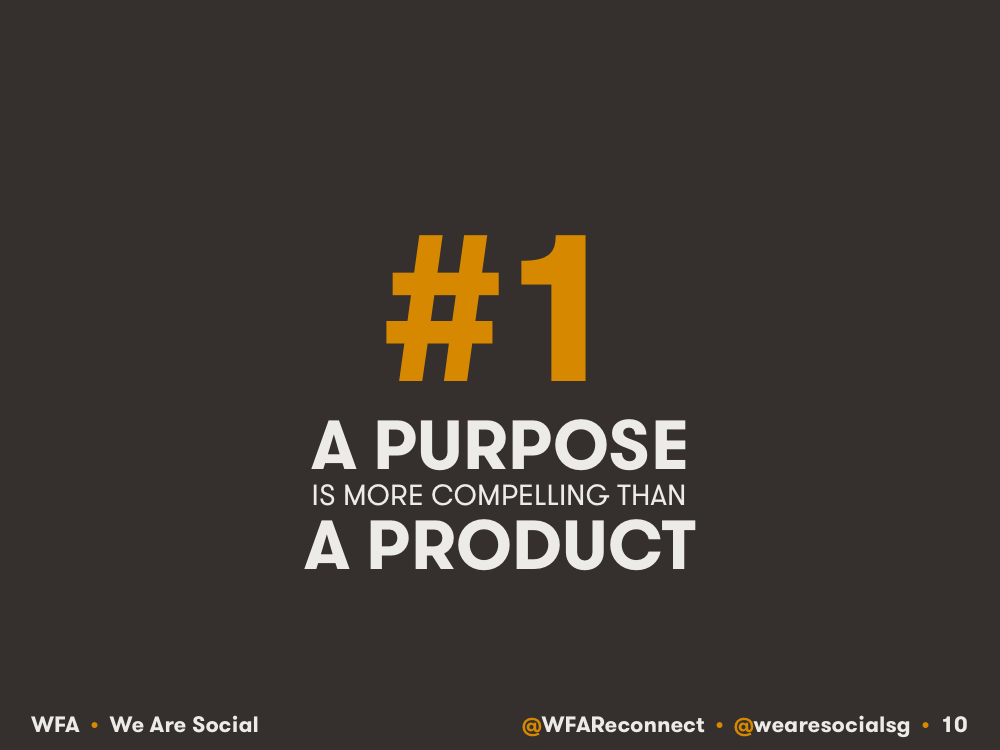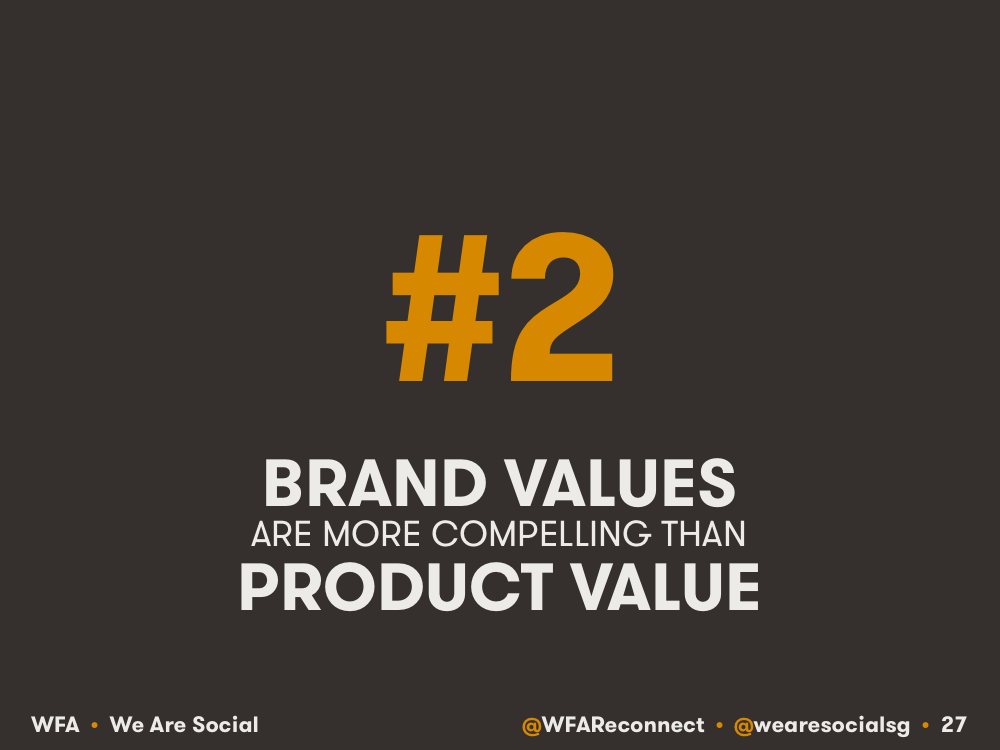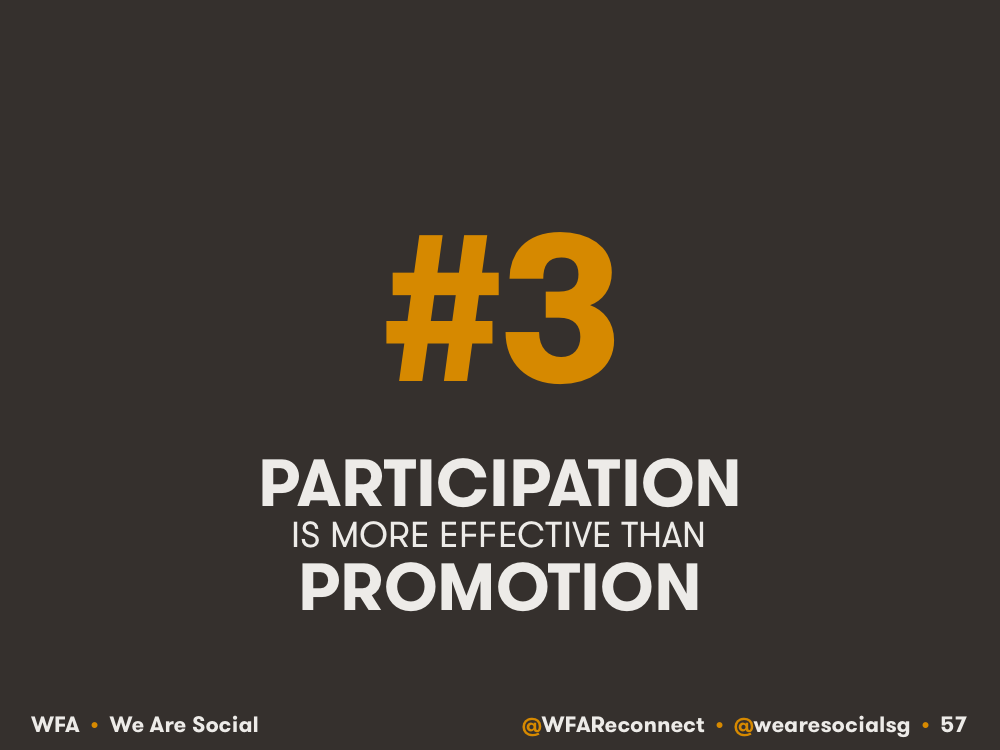Get analysis, insight & opinions from the world's top marketers.
Sign up to our newsletter.
 Most businesses consider sustainability to cover reducing a company’s environmental impact or offsetting its carbon footprint but actually a lot of consumers and marketers take a different view.
In 2012 and 2013, the World Federation of Advertisers conducted research with marketers around the issue of brand purpose. Brand purpose is not a precise synonym for sustainability but more often than not for a brand to have a clear and meaningful purpose, it involves some kind of sustainability dimension; just think of Unilever’s efforts to promote hygiene through Lifebuoy or Nike’s emphasis on promoting physical activity.
The results of our research showed unequivocally that brand purpose is important now and will be even more so in the future. Nearly nine out of ten marketers agreed and most defined it as programmes that positively impact communities, protect and improve the environment while also conducting business in an ethical matter.
However, PR agency Edelman has been asking consumers the same question as part of its Good Purpose research in a bid to understand what people worldwide expect from companies and brands. The good news is that the vast majority believe that companies have a license to do well by doing good: 76% agreed it is ok to support good causes and make money at the same time. Forty-seven per cent even said they would buy products or brands that support good causes. There appears to be a business case for doing good.
But when respondents were asked about the most important ways that brands could build trust, they didn’t mention environmental concerns or taking action to positively impact the community. The top three criteria cited were listening to consumer needs and feedback, high quality products or services and treating employees well.
These studies appear to indicate that there is a disconnect between what companies consider to be doing good and what their customers think. What business folk have long-dubbed corporate social responsibility (or “CSR”) may in fact be more a question of customer retail management and offering good service with a smile.
Causes need not be worthy or noble; people just want companies to listen to them, respond to their concerns, put them and their employees ahead of (or at least on a par with) profit, be transparent, open and communicate frequently and honestly.
Havas Meaningful Brands research asserts the majority of people worldwide wouldn't care if 73% of brands disappeared tomorrow. By extension, this suggests that 73% of brands have unsustainable business models.
At WFA, we believe that sustainability is more than protecting the environment or saving the planet. It is simpler than that and goes back to the etymology of sustainability: it’s about building and nurturing a license to sustain and endure. And this comes from having meaning, purpose and delivering value.
While we represent marketers and promote the role and value of marketing in society, we are not blind to the fact that marketing is a dirty word to some stakeholders.
The reason is that too often, marketing falls short of what people and society want and expect from companies and brands. That’s why we launched Project Reconnect in 2010: to champion what’s good about marketing, showcase the positive impact it can have on people’s lives and even raise the bar just a little in terms of some people’s perceptions of our industry.
A key strand of the programme is seeking to educate marketers about what people think is acceptable, particularly now that digital channels allow brands to communicate in a more personal and direct matter. We’ve organised focus groups in Brazil, China, UK and US allowing parents and young people to talk directly to the world’s most senior marketers. We’ve brought young people into the European Parliament to express their views directly to regulators. We’ve gone to regulators with cameras and asked them to express their views to marketers.
Just last year, we teamed up with social media agency, We Are Social, to ask people globally what are the great brands, what brand attributes do they all share and what does this tell us about the future of marketing. The results revealed that people want to see brands embody four new “P”s: people, purpose, principles and participation.
This is critical now that technology has turned the communication paradigm on its head from a push to pull model, with people now largely in control. The winners will be those brands that are able to take the time to listen to individuals and deliver personalised communications in the right context at the right time and in the right manner.
Most businesses consider sustainability to cover reducing a company’s environmental impact or offsetting its carbon footprint but actually a lot of consumers and marketers take a different view.
In 2012 and 2013, the World Federation of Advertisers conducted research with marketers around the issue of brand purpose. Brand purpose is not a precise synonym for sustainability but more often than not for a brand to have a clear and meaningful purpose, it involves some kind of sustainability dimension; just think of Unilever’s efforts to promote hygiene through Lifebuoy or Nike’s emphasis on promoting physical activity.
The results of our research showed unequivocally that brand purpose is important now and will be even more so in the future. Nearly nine out of ten marketers agreed and most defined it as programmes that positively impact communities, protect and improve the environment while also conducting business in an ethical matter.
However, PR agency Edelman has been asking consumers the same question as part of its Good Purpose research in a bid to understand what people worldwide expect from companies and brands. The good news is that the vast majority believe that companies have a license to do well by doing good: 76% agreed it is ok to support good causes and make money at the same time. Forty-seven per cent even said they would buy products or brands that support good causes. There appears to be a business case for doing good.
But when respondents were asked about the most important ways that brands could build trust, they didn’t mention environmental concerns or taking action to positively impact the community. The top three criteria cited were listening to consumer needs and feedback, high quality products or services and treating employees well.
These studies appear to indicate that there is a disconnect between what companies consider to be doing good and what their customers think. What business folk have long-dubbed corporate social responsibility (or “CSR”) may in fact be more a question of customer retail management and offering good service with a smile.
Causes need not be worthy or noble; people just want companies to listen to them, respond to their concerns, put them and their employees ahead of (or at least on a par with) profit, be transparent, open and communicate frequently and honestly.
Havas Meaningful Brands research asserts the majority of people worldwide wouldn't care if 73% of brands disappeared tomorrow. By extension, this suggests that 73% of brands have unsustainable business models.
At WFA, we believe that sustainability is more than protecting the environment or saving the planet. It is simpler than that and goes back to the etymology of sustainability: it’s about building and nurturing a license to sustain and endure. And this comes from having meaning, purpose and delivering value.
While we represent marketers and promote the role and value of marketing in society, we are not blind to the fact that marketing is a dirty word to some stakeholders.
The reason is that too often, marketing falls short of what people and society want and expect from companies and brands. That’s why we launched Project Reconnect in 2010: to champion what’s good about marketing, showcase the positive impact it can have on people’s lives and even raise the bar just a little in terms of some people’s perceptions of our industry.
A key strand of the programme is seeking to educate marketers about what people think is acceptable, particularly now that digital channels allow brands to communicate in a more personal and direct matter. We’ve organised focus groups in Brazil, China, UK and US allowing parents and young people to talk directly to the world’s most senior marketers. We’ve brought young people into the European Parliament to express their views directly to regulators. We’ve gone to regulators with cameras and asked them to express their views to marketers.
Just last year, we teamed up with social media agency, We Are Social, to ask people globally what are the great brands, what brand attributes do they all share and what does this tell us about the future of marketing. The results revealed that people want to see brands embody four new “P”s: people, purpose, principles and participation.
This is critical now that technology has turned the communication paradigm on its head from a push to pull model, with people now largely in control. The winners will be those brands that are able to take the time to listen to individuals and deliver personalised communications in the right context at the right time and in the right manner.
 Some brands have their purpose defined at birth and some have to discover it along the way. But increasingly all brands need a purpose to survive — and thrive — in today’s highly competitive market. As Marc Mathieu, Senior Vice President Marketing of Unilever says, “today, the good companies — the ones that will survive and thrive through thick and thin — care about something, because the people we serve demand it. Without a true purpose, your brand is just a banner, just another part of the visual clutter.”
Our research identified a number of examples of purposeful brands, such as TOMS shoes, Goldieblox, Dove’s Campaign for Real Beauty and P&G’s Thank You Mom campaign. A brand purpose articulates what people can buy into, not just what they can buy.
Some brands have their purpose defined at birth and some have to discover it along the way. But increasingly all brands need a purpose to survive — and thrive — in today’s highly competitive market. As Marc Mathieu, Senior Vice President Marketing of Unilever says, “today, the good companies — the ones that will survive and thrive through thick and thin — care about something, because the people we serve demand it. Without a true purpose, your brand is just a banner, just another part of the visual clutter.”
Our research identified a number of examples of purposeful brands, such as TOMS shoes, Goldieblox, Dove’s Campaign for Real Beauty and P&G’s Thank You Mom campaign. A brand purpose articulates what people can buy into, not just what they can buy.
 Linked to this is the importance of standing for clear brand principles. You expect people — at least your friends — to be truthful with you. The same is true of brands. You expect your friends to be generous, and more than ever, brands need to be generous with their content and services, even their knowledge. Brands also have to remember the importance of empathy, of caring about people’s hopes and dreams, their fears and anxieties. They also need to be fun. No one wants a boring friend, and no one wants to buy a boring brand.
Linked to this is the importance of standing for clear brand principles. You expect people — at least your friends — to be truthful with you. The same is true of brands. You expect your friends to be generous, and more than ever, brands need to be generous with their content and services, even their knowledge. Brands also have to remember the importance of empathy, of caring about people’s hopes and dreams, their fears and anxieties. They also need to be fun. No one wants a boring friend, and no one wants to buy a boring brand.
 Brands also need to let others in. This is where participation comes in. Just as we let our friends into the inner working of our lives, asking for advice and help, we can let people and partners keep us current and relevant. Together, with them, we can pioneer the future of marketing and create shared value strategies that benefit a world beyond the brand alone.
Fundamentally, if brands behave as we aspire to behave as people — truthful, authentic, generous, caring, fun, and supportive — they will be immeasurably stronger. The answer lies in a more democratic definition of marketing – adopting an ‘of the people, by the people, for the people’ approach to co-creating mutual value together with audiences, rather than dictating what people should like or buy.
None of this precludes trying to save the environment or the planet. Evidence suggests millennials put great emphasis on this and many successful brands will look to align brand strategy accordingly. But for many brands, their ability to sustain and develop depends upon making the world a better place and bringing meaning to people’s lives.
Follow us @WFAReconnect and www.project-reconnect.com
Brands also need to let others in. This is where participation comes in. Just as we let our friends into the inner working of our lives, asking for advice and help, we can let people and partners keep us current and relevant. Together, with them, we can pioneer the future of marketing and create shared value strategies that benefit a world beyond the brand alone.
Fundamentally, if brands behave as we aspire to behave as people — truthful, authentic, generous, caring, fun, and supportive — they will be immeasurably stronger. The answer lies in a more democratic definition of marketing – adopting an ‘of the people, by the people, for the people’ approach to co-creating mutual value together with audiences, rather than dictating what people should like or buy.
None of this precludes trying to save the environment or the planet. Evidence suggests millennials put great emphasis on this and many successful brands will look to align brand strategy accordingly. But for many brands, their ability to sustain and develop depends upon making the world a better place and bringing meaning to people’s lives.
Follow us @WFAReconnect and www.project-reconnect.com